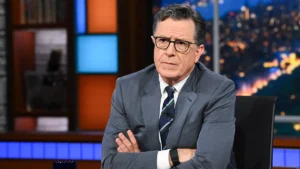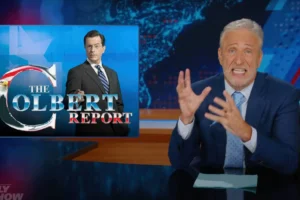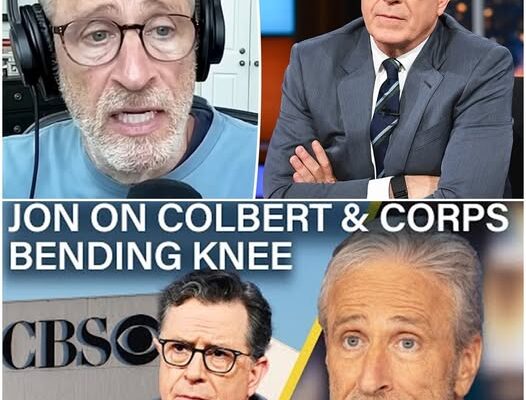The evening began like any other. The stage was set, the crew was in place, and the usual hum of anticipation filled the air. But there was something about Jon Stewart that night—something different, something that couldn’t be seen on the teleprompter, heard through the mics, or even read in the studio’s predictable script. It wasn’t just his calm demeanor, or his usual mastery over timing. No, this was something more deliberate, more dangerous. Jon Stewart was not blinking.

The countdown to air was routine, just as it had always been. “Stand by, we’re live in three… two…” The crew members, as if on cue, adjusted their headsets, shifted in their seats, and checked their scripts. The usual flurry of backstage activity continued, but the energy was tense in a way that no one could quite place. Stewart, however, sat completely still. His eyes were locked on the camera, his face taut with some unspoken emotion. Not once did he glance at the teleprompter or the crew. He was calm—eerily calm. The red lights flickered to life, and The Daily Show was officially live. But what followed was a moment no one, not even the veteran staff, had prepared for. The audience expected the usual quick-fire jokes, political quips, and biting commentary. What they got, however, was something entirely different—a break from the script that would fracture late-night television for years to come. The air in the studio shifted, and an uncomfortable stillness swept across the set. Jon Stewart, without a glance at his prepared lines, opened his mouth. “They cut his mic,” he said, the words hanging heavy in the silence, “so I turned mine all the way up.” There was no laughter. No applause. Just an awkward, electric tension that cascaded down from the stage, across the crew, and into the very heart of the broadcast. No one knew what to do. The sound was still on. The camera still rolling. But the teleprompter had been manually frozen, and the script was forgotten. Stewart’s words rang out, raw and unfiltered. “Stephen Colbert gave this network everything,” he continued, his voice unwavering. “And they repaid him with silence. So tonight, silence isn’t an option.” For the next few minutes, what had been meant to be a light, humorous broadcast turned into a searing public denunciation—a call for accountability. Stewart walked away from the host desk, his usual rhythm and structure discarded. He strode to the center of the stage, directly facing the audience, unafraid, unapologetic, and steadfast. The studio crew, still in shock, scrambled behind the scenes. But Stewart moved as if he were in command of the moment. And then, just as the audience tried to process the unexpected shift, something even more shocking happened. From the left side of the stage, a gospel choir appeared. The entrance was unannounced. No cue. No introduction. Just the sound of footfalls against the wooden stage as the choir members—first two, then four, then eight—began to march out, their black robes flowing in unison. There was no music. No instrumental accompaniment. Just the slow and steady approach of the group, positioning themselves behind Stewart in absolute silence. The audience waited. They were unsure if this was part of the show, if a joke was coming, or if they should be clapping. But the silence stretched on.

Then the voices started. “They cut the light… but they can’t dim the flame…” “They killed the sound… but the voice remains…” “They canceled the man… but the message is live…” “CBS… go f* yourself…” The final words, shockingly audacious, echoed across the studio. And just like that, the illusion of late-night control shattered. The cameras stayed on, but the feed, as it turned out, wasn’t supposed to keep rolling. One of the producers, visibly shaken, whispered, “Cut! Cut it now!” But no one moved. No one hit the emergency stop button. No one switched the feed off. Stewart, standing motionless at the center of the stage, did not blink. The internet exploded. By midnight, clips of that haunting moment, that final line delivered by the choir, spread like wildfire. Millions of views. Comments flooded in, debates erupted. What had Jon Stewart just done? Had he truly just broken the unspoken rules of late-night television? And if so, why? But what truly baffled everyone, what shocked them to their core, was CBS’s response—or lack thereof. They stayed silent. No statement. No apology. No official word. Nothing. The viral sensation, the moment that had shaken the foundations of broadcast media, was allowed to stand on its own. Stewart, the man who had become a media giant in his own right, had shown them all exactly how powerful silence could be.
As the hours passed, the clips continued to circulate. An 8-second video—Stewart standing unmoving, the choir chanting that haunting line—was dissected, analyzed, and turned into memes. On Reddit, threads debated the implications. Was Stewart really going to be fired? Would CBS respond? What did this mean for late-night television as a whole? The next morning, a former CBS executive who had been involved in Colbert’s transition finally broke their silence. “This wasn’t just about a cancellation,” they said. “It was about erasing a voice that mattered. Stewart lit the room back up. CBS is still hiding in the dark.” But the real power in the moment was in Stewart’s words, in his quiet defiance. He had made a choice—one that would echo across the media landscape for years to come.
“They cut his mic,” Stewart had said. “So I turned mine all the way up.” And he had done just that. He turned his mic up to a deafening volume that the world could hear. By the following Wednesday, the viral video was being studied in media courses across the country. Students were breaking down the power dynamics of broadcast television, the power of silence, and the fragile nature of media control. The Atlantic had called it “The Loudest Quiet Moment of the Decade.” And still, CBS said nothing. The executives remained silent, hoping that the moment would pass. But they had underestimated Jon Stewart. They had thought they could control the narrative, thought they could silence a voice that had once filled the airwaves with humor, truth, and dissent. But Jon Stewart didn’t play their game. He had written his own script, and that script was louder than any broadcast could ever be. It was a moment of rebellion. A statement to the world that sometimes, the most powerful act isn’t speaking louder—it’s simply refusing to be silenced. And in the end, that silence became the loudest noise of all.




